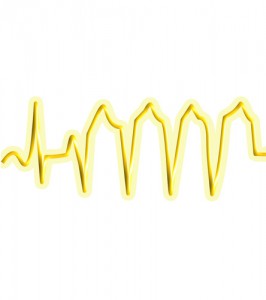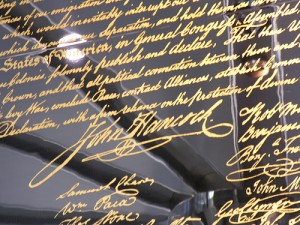Six months of emergency-free cardiac activity–or, as the Buddhists put it, a quiet heart–and out of nowhere that unquestioning confidence in the body’s automatic function gets shattered.
It’s Saturday night. For some reason I’m not falling asleep. My mouth is dry from the forced hot-air heating. I pad downstairs in the dark, scape a little sorbet from the carton in the freezer, and on the way back through the living-room I’m just checking the thermostat setting (this is the act that kicks it off: not a game of rugby or terrible news or a sudden scare, but a midnight peer at the thermostat dial) when I realize my heart is suddenly racing at 180 beats per minute, maybe more. It’s going so fast it’s hard to believe that each of those sensations is an individual heartbeat, or that a heart can beat that fast without acting like a Warner Brothers cartoon and exploding in a perthwack of cogs and a sproing of springs.
My God, it’s started again.
And at once, of course, I’m Sherlock Holmes magnifying the sole of his own shoe, the bloodhound sniffing its own butt. What had I done that could possibly have triggered this? No unaccustomed exercise, but no periods of Oblomov-like sloth, either. No work stress–that was all 4-6 days previously. None of those dietary landmines, either: no cocaine, no caffeinated coffee.
I go back to July 2010 to look for common factors, and they’re there, but utterly weird. Both then and now I was fairly recently back in Vermont from a vacation–a vacation, moreover, when I did a certain amount of moderate cycling in order to stay in shape. Pull a risk factor out of that, I defy you.
And once more, this attack is behaving just a little differently than the last two big ones. In those cases, virtually nothing I did had any effect on the arrhythmia. In this case, my heart seems to have fallen into the clutches of an insane clown. If I do anything involving the slightest effort–standing up, for instance–it dashes around frantically, shooting off paper guns and soda siphons in all directions. If I sit down and make an effort to calm my metabolism, it actually responds by slowing down–but is still utterly erratic, as if the clown had sunk into a chair and was now mumbling, plucking threads from his cuffs, scratching his vast feet, looking around fitfully as if afraid of an attack by an impossibly crowded Mini-Cooper.
I took an extra dose of flecainide acetate, my anti-arrhythmia medication, realizing I had no idea what the high-end dosage was, or even if it would have the slightest effect on an attack already in progress. My mind was already stumbling into the swamp of worst-case disasters: hospital and being shocked into sinus rhythm and then being shocked by a bill for 2,500; ablation, with the wires being pushed in around my groin and threaded all the way into my heart, to burn out tiny clusters of cells that seemed to be behaving clownishly; operations to implant a pacemaker; helpless inactivity. Death in life. I had hoped that this thing would be treated by medication alone, and now the joke was on me.
The one thing I had going for me was this unexpected ability to slow my own heart. If I sat down on the couch, propping my head on the end, and turned my breathing down to a bare-oxygen minimum, my spastic heart responded in its own crazy way. Maybe, just maybe, the same thing would happen as happened with my very first attack: I’d fall asleep and when I woke up, everything would be back to normal. A child’s dream, a Hollywood dream. A night of magical thinking.
While this was going on, and of course I wasn’t sleeping at all, I noticed two things in my usual detached-during-crisis way. Both had to do with energy and efficiency, and carts.
As I’ve said, as soon as I exerted any slight effort and my body recognized the need for more oxygen and a faster pulse to supply that increased need, my heart responded with manic alacrity, like Roger Rabbit. In a way, my calm lobe thought, this goes to show how efficient the heart usually is. When it is beating crazily like this, the actual process of oxygen transportation is wildly inefficient. It’s like a man trying to put out a fire with only a thimble to carry water: he has to wildly fling thimbleful after thimbleful at the blaze, knowing that if only he had a bucket he could walk calmly to the sink, fill it up, and extinguish the blaze in a couple of minutes. Even at 180 bpm, I was exhausted.
The other thing I noticed was how jarring my heartbeats were. It was like being in a cart going along a badly rutted road: half the horse’s strength was taken up by the erratic sideways motion of the wheels jagging this way and that, like ground-level turbulence. Whenever my heart fell into a more-or-less normal rhythm for a few beats, I could tell without taking my pulse: it was immediately obvious that the clashing currents and counter-currents had ceased, and the ocean had fallen down to a regular swell that was as quiet as it was rhythmic.
Around 4, I fell asleep. Around 5:15 I woke up. Nothing had changed. My heart had not fallen back into sinus rhythm.
For an hour a lay as quietly as I could, calculating. At some point, I decided, I’d go upstairs to the bathroom cabinet and take a double-dose of flecainide, just as a last throw of the dice. I’d give that maybe an hour, by which time the family would be waking up, and if my heart was still in chaos, I’d drive up to the emergency room and ask for the taser.
I went upstairs around 6, moving as slowly as I could, already feeling like an old man, already feeling a foot in the grave. I took two flecainide and sat down on the toilet–and realized at once, the way we know without waking up that the sun has already risen, that my heart had fallen quiet. Just in the last few seconds.
Nothing to do with the pills. Nothing to do with sleep. Nothing to do with anything, just as the whole episode had started with nothing to do with anything.
For probably four minutes I didn’t dare move. Then, very carefully, I shifted six feet and sat on the edge of the bath. Four more minutes. Still nothing.
Very carefully, I twisted around and turned on the taps. Another four minutes. Very carefully, I let my bathrobe slip off and sank into the bath, thinking, I don’t believe it. It’s a miracle. It’s a bloody miracle.


